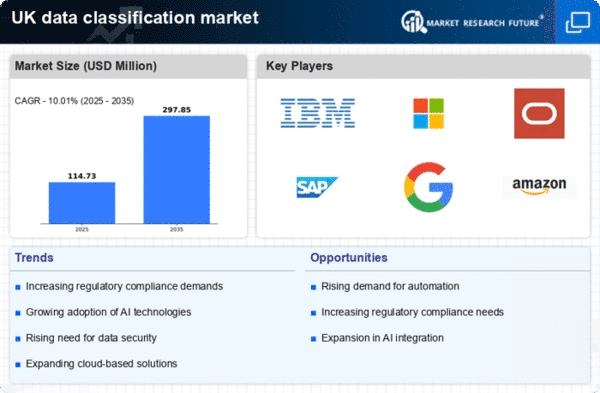Rising Data Privacy Concerns
The data classification market is experiencing a notable surge due to increasing concerns regarding data privacy among consumers and businesses in the UK. With the implementation of stringent regulations such as the General Data Protection Regulation (GDPR), organisations are compelled to classify and manage data effectively to ensure compliance. This has led to a heightened demand for data classification solutions, as companies seek to protect sensitive information and avoid hefty fines. The market is projected to grow at a CAGR of approximately 15% over the next five years, indicating a robust expansion driven by the need for enhanced data governance. As organisations strive to build trust with their customers, will play a crucial role in shaping data management strategies across various sectors..
Increased Focus on Data Security
The data classification market is being propelled by an increased focus on data security among UK businesses. As cyber threats become more sophisticated, organisations are recognising the necessity of classifying data to implement appropriate security measures. By categorising data based on sensitivity and criticality, companies can better protect their assets and mitigate risks associated with data breaches. The market is anticipated to grow by approximately 10% over the next few years, driven by the urgent need for robust data protection strategies. This trend is particularly evident in sectors such as finance and healthcare, where data security is paramount. Consequently, the data classification market is likely to see a surge in demand for solutions that offer comprehensive security features, further solidifying its importance in the broader data management landscape.
Growing Demand for Data Analytics
The data classification market is witnessing a growing demand for data analytics capabilities in the UK. As organisations increasingly rely on data-driven decision-making, the need to classify data effectively has become paramount. By implementing data classification solutions, businesses can enhance their analytics processes, ensuring that the right data is accessible for analysis. This trend is expected to drive market growth at a rate of around 14% in the coming years, as organisations seek to leverage data for competitive advantage. Moreover, the integration of data classification with analytics tools is becoming more common, suggesting a shift towards more informed and strategic business operations. As the appetite for data analytics continues to rise, the data classification market is likely to evolve to meet these demands.
Emergence of Industry-Specific Solutions
The data classification market is evolving with the emergence of industry-specific solutions tailored to meet the unique needs of various sectors in the UK. Different industries, such as finance, healthcare, and retail, have distinct data classification requirements driven by regulatory compliance and operational needs. This trend indicates a shift towards customised data classification tools that address specific challenges faced by organisations. The market is projected to grow by approximately 11% as businesses seek solutions that align with their industry standards. Furthermore, the development of these tailored solutions suggests a deeper understanding of the complexities involved in data management across different sectors. As organisations continue to prioritise industry-specific needs, the data classification market is likely to expand to accommodate these diverse requirements.
Technological Advancements in Data Management
Technological advancements are significantly influencing the data classification market, particularly in the UK. Innovations in machine learning and artificial intelligence are enabling more sophisticated data classification techniques, allowing organisations to automate the categorisation of vast amounts of data. This automation not only enhances efficiency but also reduces the risk of human error, which is crucial in maintaining data integrity. The market is expected to witness a growth rate of around 12% annually as businesses increasingly adopt these advanced technologies. Furthermore, the integration of data classification tools with existing data management systems is becoming more prevalent, suggesting a trend towards seamless data workflows that enhance operational efficiency. As organisations continue to invest in technology, the data classification market is poised for substantial growth.
















